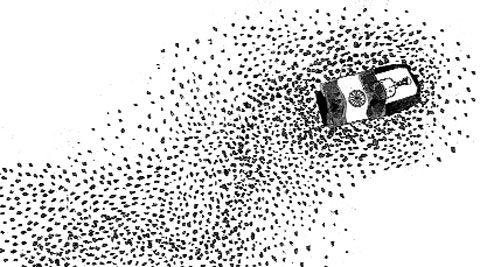Inder Malhotra
The Indina Express
14 November 2014
On the day Jawaharlal Nehru
passed into history, I was in Pakistan as a consequence of his last major
policy decision. Overruling his senior advisors, he released his old, if
estranged friend, Kashmir’s towering leader, Sheikh Mohammed Abdullah, from
prolonged and unjust imprisonment; withdrew the meandering “Kashmir Conspiracy”
case against him; invited him to be his house guest at Teen Murti; and
encouraged him to go to Pakistan to explore with its then president Field
Marshal Ayub Khan the possibility of a settlement of the Kashmir issue. “Let
Sheikh try,” he told his cabinet. Preceded by a large number of us journalists,
the Sheikh arrived in Rawalpindi on May 23 and was given a reception reserved
for a friendly head of state or a national hero. For three days, he and the
field marshal held extensive talks, but on the evening of May 26, he and a
Pakistani spokesman announced the failure of the Sheikh’s mission. However,
both sides also stated that in the month of June, Nehru and Ayub would meet in
Delhi and the Sheikh “would not be far away from the conference table”.

Despite understandable
disappointment over the talks’ failure, there was great excitement on the
morning of May 27 because Sher-e-Kashmir (as Abdullah was usually hailed) was
going to “Azad Kashmir”, and the Pakistan government had reluctantly allowed
Indian journalists to accompany him. Our instructions were stern: “Be at the
president’s guesthouse by 7.45 am because the Sheikh’s caravan will leave
exactly at eight”. We knew better but decided to obey. In the best
subcontinental tradition, nothing happened for a couple of hours.
We were saved from boredom, however, by cordial conversations with our hosts
and endless rounds of tea, coffee and delectable kebabs.
At one stage, a Pakistani
colleague and friend, Asrar Ahmed, asked me whether Ayub and Nehru would be
able to work out a compromise on Kashmir. This, he added, was vital because
these two were perhaps the last leaders who could “sell” a compromise to their
respective peoples. Stressing the obvious, I replied: “Asrar, it depends on how
much time Nehru has.” At this, everyone at my table exclaimed: “May Allah
prolong his life!” As if on cue, Hafeez Jullundhri, the nearest thing to a poet
laureate Pakistan had and a virtual minister-in-waiting during the Sheikh’s
stay, walked up to our table and occupied one of the several chairs vacated for
him. Then he told me in chaste Punjabi: “Inder Malhotra, both of us on either
side of the Wagah border are b*******. You people have had a long ride feeling
superior to us because you were lucky to have Nehru to lead you for so long.
Our misfortune was that Jinnah died within 13 months after the birth of
Pakistan and Liaquat was killed soon afterwards. Now Nehru is not going to
last, and then you will descend to our level.” While some tried to remonstrate
with the much-respected Hafeez, Sheikh sahib came out and the incident was
brushed aside in the excitement of departure.
I don’t know whether
Murree’s Lintott’s Restaurant still exists but it was in the midst of a most
friendly reception at it that we first heard that Nehru had been taken ill. The
exuberant mood was replaced by anxiety. Nehru died at the precise moment we set
foot in Muzaffarabad, the capital of Pakistan-occupied Kashmir. I cursed my
fate that I had to be away from Delhi. My second worry was that Muzaffarabad
was not the best place to be in because people there were likely to be hostile
to Nehru. But as I looked around I was stunned. The large crowd that had
collected to welcome Sheikh Abdullah had turned into a mourning mass. With both
hands raised skywards, everyone was praying for Nehru. The epicurean meal the
Kashmiris call wazwan remained completely untouched. There was a commotion in a
distant part of the gathering. Someone was beating his forehead with both his
hands and cursing his “black and evil tongue”. He was also shouting my name. It
was Hafeez Jullundhri. He came up to me and apologised profusely. The Sheikh
joined us to calm down Hafeez. Instead, the two tall men embraced and sobbed.
Agha Shaukat, a Pakistani official, whose two brothers held very senior posts
in Srinagar, drove Prem Bhatia, my professional guru and then Delhi editor of
The Indian Express, and me to foreign minister Zulfikar Ali Bhutto’s house in
Rawalpindi. However, on the way, he stopped at a dhaba near a small town and
insisted that we have tea and snacks. I don’t know how our presence became
known to them but a large number of people came to express condolences to us.
Each said: “He was a great and good man.” At Bhutto’s residence, some
Delhi-based foreign correspondents were already present and arrangements had
been made to fly us to Delhi as soon as possible. The overworked crew of the
aircraft could not have been more courteous and helpful to us. It was late in
the night when we landed at Palam. I decided to go home via Teen Murti. But
reaching near it, I discovered that the area was so crowded by those assembled
to have the departed leader’s last darshan that my driver had to turn back and
take a different route. Since Nehru’s funeral had to be delayed for the arrival
foreign dignitaries, more and more crowds kept pouring into the Indian capital
from different parts of the country. In death, as in life, Nehru’s popularity
had to be seen to be believed. After he had been consigned to the flames, the
eminent British journalist, James Cameron, reported in The Guardian that on
that day Delhi had become the “most overpopulated spot on the
hemisphere”.
The
writer is a Delhi-based political commentator
(Series concluded)


कोई टिप्पणी नहीं:
एक टिप्पणी भेजें